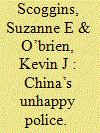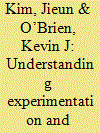|
|
|
Sort Order |
|
|
|
Items / Page
|
|
|
|
|
|
|
| Srl | Item |
| 1 |
ID:
144749


|
|
|
|
|
| Summary/Abstract |
Facing heavy caseloads, administrative drudgery, and low pay, China’s street-level police are frustrated. Front-line officers from six cities report that discontent encourages shirking, corruption, and waste. Grievances and feelings of powerlessness have not been reduced by recent reforms, and give us cause to rethink the image of police as effective arms of a highly securitized state.
|
|
|
|
|
|
|
|
|
|
|
|
|
|
|
|
| 2 |
ID:
153572


|
|
|
|
|
| Summary/Abstract |
Using riot police to break up a big demonstration is a familiar occurrence
in many parts of the world, including China. But all protest
control does not involve the use of force, nor is repression always
directed at large groups of people assembled in one location. Some
repression rests on psychological rather than physical coercion and is
aimed at individuals, often in their homes or nearby. This type of
repression may be carried out by people with only a loose connection
to the state’s coercive apparatus, such as relatives, friends, or neighbors
of the target who work for the government or receive benefi ts from it.
“Relational repression” is labor intensive and a sign of a high-capacity
state that uses multiple levers to suppress contention, but has limited
reach and remains insecure about its ability to maintain social stability.
It builds on Maoist and dynastic techniques of control and aims to
extend state penetration into a marketized society whose members have increasingly emancipated themselves from direct dependence on the
government. Relational repression oft en alienates both the agents of
repression and their targets. But it can, at times, be eff ective in demobilizing
resistance or preventing a person from taking part in protest.
|
|
|
|
|
|
|
|
|
|
|
|
|
|
|
|
| 3 |
ID:
139843


|
|
|
|
|
| Summary/Abstract |
When faced with homeowners who refuse to accept appropriation of their property, local authorities often use family ties to extend the state’s reach. To complete urban renewal, municipal demolition offices turn to resisters’ relatives who work for government bureaus, state-owned factories, schools and hospitals. Under pressure and the threat of sanctions, many work-unit members agree to pressure their relatives into signing demolition agreements, often by tapping into “feelings of affection” and emotional blackmail. Beyond emptying a neighborhood, “harmonious demolition” has many consequences: it can turn relatives against each other, lead to divorce, and produce disillusionment and anger. Although “demolition by implicating family members” was banned in 2010, it continues. Using vertical ties to pressure unit members and horizontal ties to influence relatives does not herald a softer authoritarianism, but instead alienates homeowners and work-unit members alike.
|
|
|
|
|
|
|
|
|
|
|
|
|
|
|
|
| 4 |
ID:
163710


|
|
|
|
|
| Summary/Abstract |
Bringing knowledge about China to the disciplines has reduced the outsized role that research on Europe and America has on many topics. But mainstreaming China studies also leads to certain tradeoffs. How should we manage these tradeoffs and produce research that is both true to China and contributes to the social sciences? In the last 40 years, China scholars have developed many strategies to navigate the territory between area studies and the social sciences. I myself have vacillated about how China studies and political science should interact and inform each other. How are scholars addressing this issue now, in an era of mixed methods, sophisticated quantitative research, experiments and “big data?”
|
|
|
|
|
|
|
|
|
|
|
|
|
|
|
|
| 5 |
ID:
179969


|
|
|
|
|
| Summary/Abstract |
Studies of local governance in China often point to nimble experimentation but problematic implementation. To reconcile these competing images, it is useful to clarify the concepts of experimentation and implementation and see how they unfolded in one policy area. The history of China’s Open Government Information (OGI) initiative shows that the experimentation stage sometimes proceeds well and produces new policy options, but may falter if local leaders are unwilling to carry out an experiment. And the implementation stage often poses challenges, but may improve if the Center initiates new, small-scale experiments and encourages local innovation. This suggests that the experimentation and implementation stages are not so different when officials in Beijing and the localities have diverging interests and the Center is more supportive of a measure than local officials. The ups and downs of OGI, and also village elections, can be traced to the policy goal of monitoring local cadres, the central–local divide, and the pattern of support and opposition within the state.
|
|
|
|
|
|
|
|
|
|
|
|
|
|
|
|
|
|
|
|
|